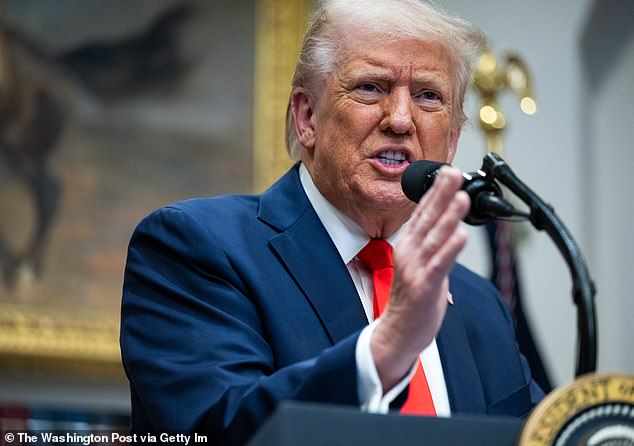Donald Trump was the inheritor of the G7’s best performing economy.
The January Davos update from the International Monetary Fund (IMF) projected US output to expand by 2.7 per cent in 2025 after a barnstorming 2024 when it grew by 2.8 per cent.
The rhetoric and actions of the White House since the Trump inauguration in January now threaten to derail confidence and stymie prosperity.
A rapid-fire series of policy decisions is undermining buoyancy. Tariff wars with Canada, Mexico and China (with the EU next in line), the scythe being taken to public spending by Elon Musk’s efficiency department and the tilt away from Europe and Ukraine to Russia have cast a pall of uncertainty over financial markets.
Data from the Atlanta Federal Reserve points to a calamitous tumble in annualised output of minus 2.8 per cent, driven by subdued manufacturing.
The US trade deficit soared to $153billion (£122billion) in January, partly driven by firms ramping up imports ahead of tariffs.

Tariff plan: The rhetoric and actions of the White House since the Trump inauguration in January now threaten to derail confidence and stymie prosperity
As in Britain, consumer confidence has plummeted and is now at its lowest point in three-and-a-half years, and real spending has slumped to its worst level since 2021.
All of this has led to fears of what Reuters describes as a ‘Trumpcession’. For an administration promising to make America great again, this is all a bit rum.
Financial markets are picking up on the vibes with the seemingly invulnerable Nasdaq, powered by Big Tech, at the start of a correction.
Cash is flowing from equities into US Treasuries as private investors and fund managers seek safer assets. Uncertainty creates a ‘wealth effect’ with better-off consumers reluctant to spend.
Both the Starmer government, with its rhetoric about black holes, and Trump, with his indiscriminate imposition of tariffs on friendly states, have failed to recognise the impact of uncertainty on human and corporate behaviour.
Trump may be seeking to lift the burden of regulation and lower taxes for the better off but his unpredictable policies mean that consumers and countless companies are in a limbo.
Trade analysts warn that tit-for-tat sanctions on free trade are a big negative for commerce, output and prosperity.
Plunging confidence, of the kind which already has placed Britain on the road to fiscal ruin, is in danger of trashing the world’s largest economy.
Wrong medicine
Stefano Pessina was supremely confident when he took his Alliance Boots pharmacy empire across the Atlantic. The marriage with Walgreen, with the help of private equity kings KKR, was meant to be the start of a global health empire.
At times it looked as if the Italian magnate might pull it off. Soon after the merger, the value of the group soared to $100billion (£80billion) in New York. But it has been downhill ever since.
The group doubled down on prescriptions, as margins were squeezed. Efforts to convert the Americans to Boots’ upmarket Number 7 beauty brands fell on fallow soil.
High financing costs, the result of a series of debt-fuelled deals, undermined profitability and Walgreen’s effort to diversify into primary care, providing doctor services, was an expensive mistake.
Efforts to save the day, by hiving off Boots or refloating it in London, stumbled because of adverse market conditions and balance sheet complexities.
Now the Wall Street Journal reports that the whole caboodle looks set to be sold to another private equity firm, Sycamore Partners, for $10billion (£8billion) or just one-tenth of its peak value.
As if anyone needed any reminding, even Britain’s best retailers, such as Tesco, M&S and Sainsbury’s, struggled when it comes to transferring skills to the US. So far, Ireland-based Primark, part of ABF, might be an honourable exception.
Name dropper
The merger of Aberdeen and Standard Life, which saw a doubling up of management, predictably led to a power struggle with the original players Martin Gilbert and Keith Skeoch jettisoned amid abysmal performance.
An effort to re-energise the enterprise with a trendy name change to Abrdn by the previous boss Stephen Bird failed miserably.
His successor Jason Windsor sensibly has restored the trusted Aberdeen brand and has unveiled a new, ambitious series of targets. Now he must deliver.
But activist investing, as Schroders is discovering, is tricky in the low-cost world of ETFs and tracking.
DIY INVESTING PLATFORMS

AJ Bell

AJ Bell
Easy investing and ready-made portfolios

Hargreaves Lansdown

Hargreaves Lansdown
Free fund dealing and investment ideas

interactive investor

interactive investor
Flat-fee investing from £4.99 per month

Saxo

Saxo
Get £200 back in trading fees
Trading 212
Trading 212
Free dealing and no account fee
Affiliate links: If you take out a product This is Money may earn a commission. These deals are chosen by our editorial team, as we think they are worth highlighting. This does not affect our editorial independence.
Some links in this article may be affiliate links. If you click on them we may earn a small commission. That helps us fund This Is Money, and keep it free to use. We do not write articles to promote products. We do not allow any commercial relationship to affect our editorial independence.
This article was originally published by a www.dailymail.co.uk . Read the Original article here. .

